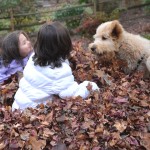
“Over the years I’ve come to appreciate how animals enter our lives prepared to teach and far from being burdened by an inability to speak they have many different ways to communicate. It is up to us to listen more than hear, to look into more than past.” Nick Trout, Love is the Best Medicine: What Two Dogs Taught One Veterinarian about Hope, Humility, and Everyday Miracles
In August of this past year, we found Chase, a 12-week-old Golden Doodle whose owners were unable to keep him. He has become a family member,– our only “son” and a (very large!) “baby brother” to our girls. In thinking about what to post for the New Year, I realized that Chase himself is a daily example of several themes I’d like to remember:
Play. Be silly. And don’t worry about what people are thinking.
Chase is a total goofball. He looks like a Muppet with a huge, toothy grin. He trips over his own feet and somersaults when playing fetch. Unself-conscious  joy is attractive. Some people never had the chance to play when they were children. They lived in an unsafe environment and had to be on guard. Or their parents needed them to be “little adults.” For whatever reason, they couldn’t develop the playful, imaginative parts of themselves. It is never too late to create space and opportunity for these parts of you to grow.
joy is attractive. Some people never had the chance to play when they were children. They lived in an unsafe environment and had to be on guard. Or their parents needed them to be “little adults.” For whatever reason, they couldn’t develop the playful, imaginative parts of themselves. It is never too late to create space and opportunity for these parts of you to grow.
Show love when you feel it.
Every day without reservation, Chase shows us the unabashed love he feels for us. His head pops up in the dining room window the moment our car pulls into the driveway. He kisses, cuddles, smiles, tackles, and wags. I wonder sometimes why it can be so much easier for us to voice frustrations with the people we love than to express warmth and tenderness. Many couples who come for treatment are able to change the atmosphere of their relationships by beginning to call attention to positive moments. A couple of weeks ago, when my husband and I were feeling tense and annoyed with each other, he instantly turned things around by commenting, “Thanks for taking care of the girls’ school stuff and doctor appointments this week. I know it’s been a lot.”
Ask for what you need and want, and let yourself receive.
This evening while I was putting clean sheets on our bed, I glanced over and saw Chase splayed on his back, dust mop paws flopped on his chest, gazing longingly at  me,– a direct request for belly scratches. When receiving this much-loved form of affection, Chase is the picture of openness, trust, and satisfaction. In my office several times a week, I hear shame about basic human vulnerabilities, needs, and desires. To me, it takes a great deal more strength to receive than it does to be “in control” and self-sufficient all of the time.
me,– a direct request for belly scratches. When receiving this much-loved form of affection, Chase is the picture of openness, trust, and satisfaction. In my office several times a week, I hear shame about basic human vulnerabilities, needs, and desires. To me, it takes a great deal more strength to receive than it does to be “in control” and self-sufficient all of the time.
Trust your body’s signals.
Chase doesn’t skip breakfast because he’s worried about his weight. He doesn’t stay awake half the night to meet a deadline. We so often ignore basic physical cues– hunger and fullness, thirst, exhaustion, a restless desire to move our muscles, or even an instinct that tells us that something isn’t right and we need to protect ourselves. Our bodies are full of important information about how to be healthy and safe, if we pay attention and stay connected.
Take steps to put yourself out of your comfort zone.
When Chase first came to live with us, he could climb up the stairs, but he was afraid to come down. We worked with him to master one step, then two, then three, until he could manage the whole staircase, and now he bounds up and down with ease. Until recently, Chase believed he was stuck behind doors that were ajar, and he would cry to be allowed in. The other day, with a little prompting from our younger daughter, Chase nudged the door open with his nose. What a discovery! We all may catch ourselves thinking, “I can’t.” We can find ways to expose ourselves slowly to those situations we fear, and new doors may open.
Accidents happen.
Enough said. Go easy on yourself.
Practice listening without interrupting, judging, comparing, or fixing.
This is one I’d like to work on. Obviously, a puppy is a great “listener.” I am never surprised to hear a client say that his or her safest emotional connection in childhood was with a beloved pet: “I could tell her anything and it was okay.” “He loved me just as I was.” “I told her all of my secrets.” How often are we really present with people, without our own agendas, opinions, or needs interfering?
Find things that are comforting and nurturing for you, and make them a daily part of your life.
Chase loves his stuffed elephant. He cuddles with our shoes and boots. He seems to feel especially  happy when he can spend time in the car or on his bed. So many people, especially those with trauma or abuse in their backgrounds, have trouble knowing what feels safe and nurturing for them, or they feel guilty taking the time to give themselves good things. Make a commitment to take care of yourself in this New Year.
happy when he can spend time in the car or on his bed. So many people, especially those with trauma or abuse in their backgrounds, have trouble knowing what feels safe and nurturing for them, or they feel guilty taking the time to give themselves good things. Make a commitment to take care of yourself in this New Year.
About Lynn Davies
I am a Licensed Clinical Professional Counselor with a Master of Science in Pastoral Counseling from Loyola University in Maryland. I have been in private practice for over fourteen years and have experience working with adults and adolescents, addressing a variety of issues: anxiety, depression, relationship problems, past or current trauma, eating disorders, self-mutilation, bereavement, parenting concerns, boundaries, and self-care.
- Web |
- More Posts(22)

